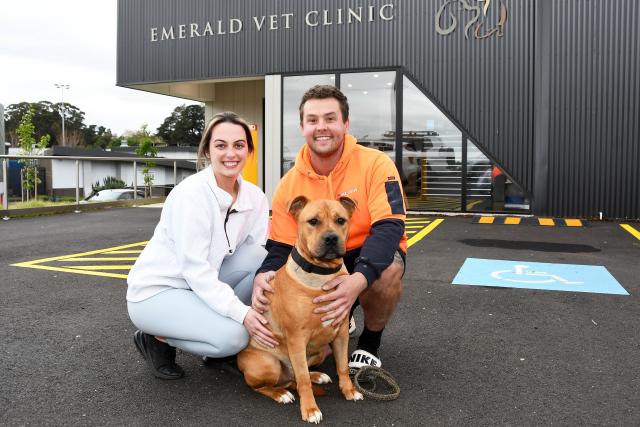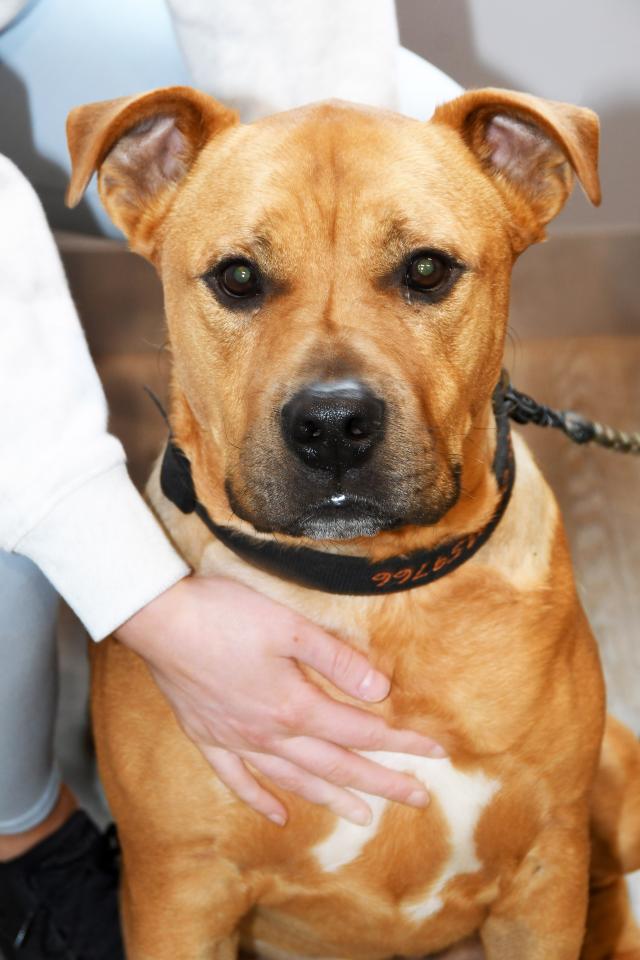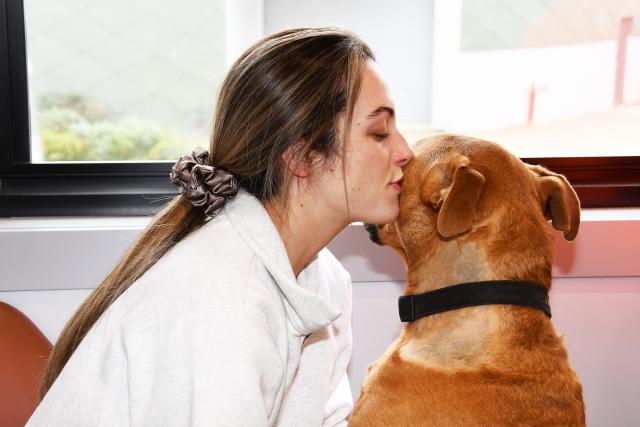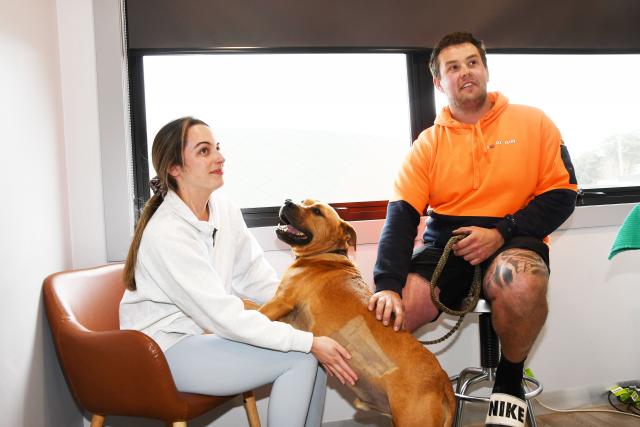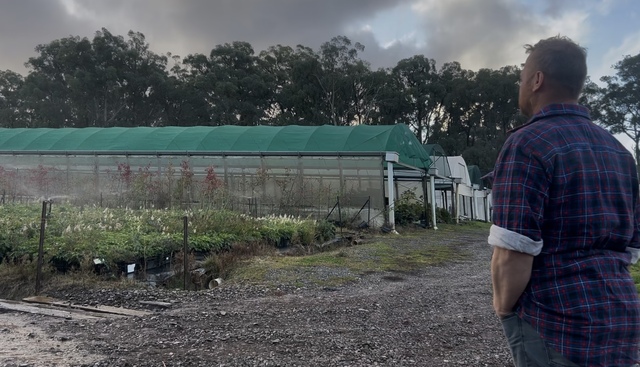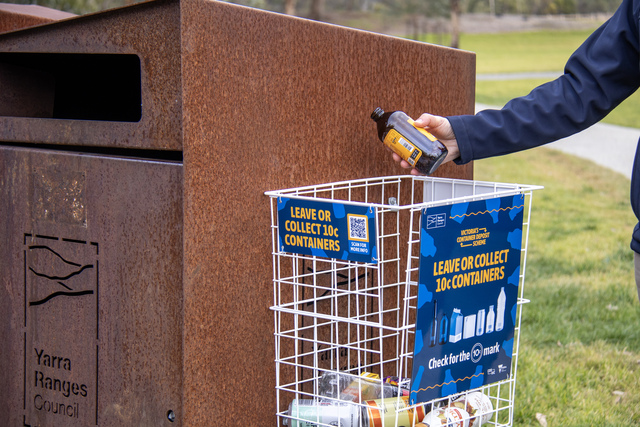One furry local has survived a fatal disease that is becoming more common in Victoria.
Sarge, an American Staffordshire Terrier, was recently diagnosed as having Leptospirosis – a bacterial infection mostly spread via urine from farm animals and local wildlife that can affect dogs and humans.
Sarge’s parents, Luke Ramsden and Taylah Versteegen, did everything they could to save their fur baby, who is now well on the road to recovery.
Mr Ramsden said the best thing they did was act quickly on Sarge’s change of behaviour, which saved his life.
“It all started when he got a bit lethargic at home, originally we didn’t think too much about it and thought he might have just eaten something he shouldn’t have.
“The next day he was getting worse, he wasn’t eating or anything, so we took him down to Emerald Vets to get him looked at,” he said.
After a few blood tests and other checks at Emerald Vets, which “weren’t looking too good”, Mr Ramsden said Sarge got referred to Dandenong, where he was rushed straight into the emergency room for the night.
“He didn’t get better over night there either.
“The main concern was that he wasn’t producing urine, so he was given tablets to try and get things moving, which didn’t work,” he said.
From there, Sarge’s journey took a turn for the worse, after vet nurses at Dandenong told his parents that their pup’s best hope was a vet clinic in Sydney that could run dialysis on him.
Mr Ramsden said it was a quick turnaround for the pair, but one they didn’t even think twice on.
“When the Dandenong nurses called us the next morning, we went straight there to pick up Sarge and see what was going on.
“We basically left straight from there with our other pup, and drove straight to Sydney.
“We got there at around 10pm that night, and Sarge went straight into the emergency room up there,” he said.
Not knowing what was going on, both Mr Ramsden and Ms Versteegen stayed in Sydney for a few days, waiting to hear how Sarge was doing.
The trip to Sydney came with several complications for the pair and their pup, who underwent several rounds of dialysis to help remove the toxins in his body – in place of his kidneys.
Mr Ramsden said it was a difficult time for everyone involved.
“While Sarge was going through dialysis, he got a blood infection that became more important than his kidneys, which the vets thought was from his dialysis tube or his feeding tube in his neck.
“We had to decide whether to remove the dialysis tube, even though Sarge may have needed more, or to have it removed and replaced, but Sarge might not have woken up from the general anaesthetic.
“We chose to have it removed and hoped for the best, and it ended up being the feeding tube that gave him the blood infection.
“Sarge also had an internal bleed during the time he was in ICU that had to be taken care of,” he said.
In total, Sarge spent around two weeks in the ICU unit in Sydney, and another additional week in the hospital before he was cleared to go home.
Mr Ramsden said it was difficult not being with their pup.
“We flew up to Sydney twice during the weekends to visit him and check in, and we drove up to pick him up when we could,” he said.
Thankfully, Sarge has been home for approximately a month now with a few shaven patches of fur, and Ms Versteegen said he is getting back to being himself again.
“When he came home we had to feed him through his feeding tube until he could eat by himself.
“We were able to remove the tube a couple of weeks ago.
“He’s eating by himself again, he’s put on the weight that he lost over the last couple of months, and he’s getting his energy back as well,” she said.
Mr Ramsden said through the whole experience, everyone was great with them and Sarge.
“The nurses in Sydney were messaging us at least twice a day, and sometimes overnight, giving us updates on how Sarge was going.
“He was getting blood tests every day so they gave us the results each day on those,” he said.
Reunited with their pup, Mr Ramsden and Ms Versteegen said any pet owners who notice something different about their pets should act quickly to get them taken care of.
“Time is definitely not on your side in these situations – if you notice something like they stop eating, getting lethargic or acting differently, definitely go and get them checked sooner rather than later.
“If we had been a day later he wouldn’t have made it,” said Mr Ramsden.
Emerald Vet Clinic senior veterinarian and director Gajen said the clinic is working to spread awareness about leptospirosis in the community.
Originally, the disease was first discovered in 1946 and is more prominent in Queensland and New South Wales, and hasn’t really been seen in Victoria until 2019.
Leptospirosis is an evolving disease in Victoria, with Sarge being only the fifth case in the state to have been diagnosed, however for Gajen, Sarge is the second dog this year to be treated for the disease.
Gajen said locals need to be proactive with their pets, and aware of the signs to bring them into the vet.
“Leptospirosis is mostly found in native wildlife like rodents, native rats, or cattle.
“It can take around 10 days to see the signs, but sometimes dogs don’t show any symptoms of the disease.
“The disease is quite infectious, and can also be passed on to humans,” he said.
Leptospirosis mostly affects the kidneys in dogs, with a significant “curing” time before any signs may be noticed, Gajen explained.
“In the first 10 days from infection, the bacteria builds up in the dogs’ bloodstream, then overtime passes through to the liver and kidneys.
“It can also cause damage to the dogs’ eyes and lungs,” he said.
Gajen said they are taking the disease very seriously at the Emerald clinic, and urges locals to do the same.
“Any dogs that come with increased kidney enzymes or liver enzymes, and the dog not eating or appearing quite lethargic are being treated for this leptospirosis,” he said.
According to the veterinarian, it is important for dog owners to be proactive with their pets rather than reactive, which can be too late in some circumstances.
Gajen said there are several things locals can do to take care of their dogs against leptospirosis.
“There is a vaccine available that can help with prevention, and is the best way to go.
“If you live in an area where there is wildlife or stagnant water, keep an eye on your dogs and don’t let them in or to drink the water, and keep an eye on cattle or farmland areas where you can,” he said.
Whilst Leptospirosis is not the most common in Victoria, it is becoming increasingly common in the state.
For more information or to book a vaccine for your dog, visit emeraldvets.com.au/

